1 - Expected post-Chinafy results
What is Heroku and do their websites work well in China?
This article delves into understanding what Heroku is, its advantages, and explores how Heroku-hosted websites perform across speed and functionality in China.
What is Heroku?

Heroku, founded in 2007, revolutionized cloud application deployment by simplifying the process for developers. It provides a platform that abstracts away infrastructure management, allowing developers to focus solely on code development and application logic. Heroku supports multiple programming languages, including Ruby, Node.js, Python, Java, and more, making it versatile for various development projects.
At its core, Heroku offers a scalable runtime environment known as Dynos, which executes web requests and background jobs. Developers can deploy their applications effortlessly using Git, Docker, or GitHub integrations. Heroku's robust ecosystem includes add-ons and extensions for functionalities such as databases, caching, monitoring, and security.
What are the advantages of using Heroku for website hosting and deployment?
Good for Beginners and Experienced Users Alike
Heroku has been around for more than a decade, and has shown exponential growth in recent years, becoming a leader among experienced PaaS providers. Heroku's commitment to providing detailed documentation ensures that developers, regardless of their experience level, can easily navigate the platform and leverage its capabilities to build and deploy applications efficiently.
Multiple Types of Add-ons
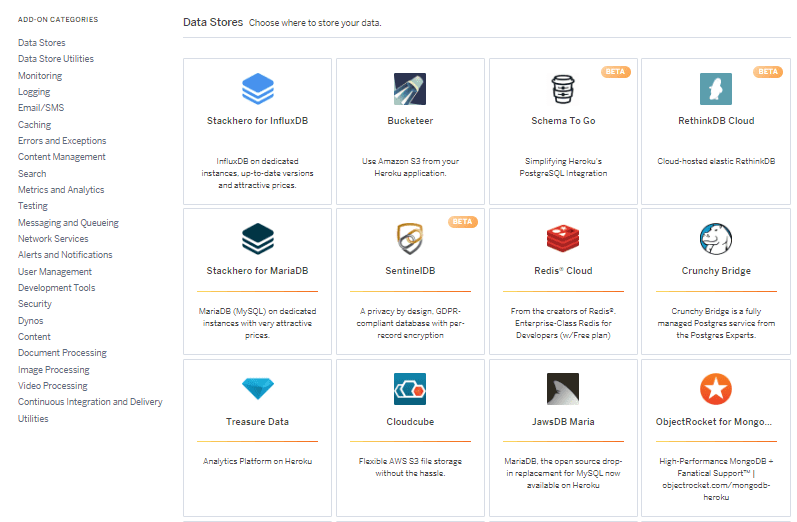
Heroku Add-ons
Heroku offers a wide range of add-ons that cater to various needs and functionalities, making it a versatile platform for developers.
These add-ons cover everything from databases and monitoring tools to security and performance enhancements. For instance, developers can seamlessly integrate databases like PostgreSQL, MongoDB, or Redis into their applications for efficient data storage and retrieval.
Monitoring add-ons such as New Relic or Papertrail provide insights into application performance, logs, and errors, enabling developers to identify and resolve issues quickly. Moreover, Heroku offers add-ons for security features like SSL encryption and firewall protection, ensuring robust protection for applications and sensitive data.
Smooth Scaling Option
Web UI and CLI enable seamless scaling capabilities like dynos.
Dynos are lightweight Linux containers responsible for running a single user-specified command. In the context of Heroku, dynos are units of computing power used to run and scale applications. They are the basic building blocks of Heroku's platform-as-a-service (PaaS) architecture, allowing developers to deploy and manage their applications easily. Each dyno can run a specific process, such as a web server or worker task, and can be scaled horizontally to handle increased traffic or workload.
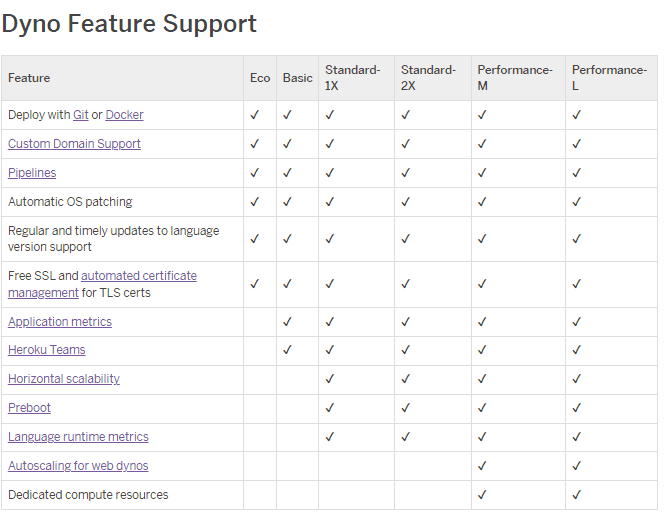
Dyno Feature Support. Image from Heroku Dev Center
Private Spaces
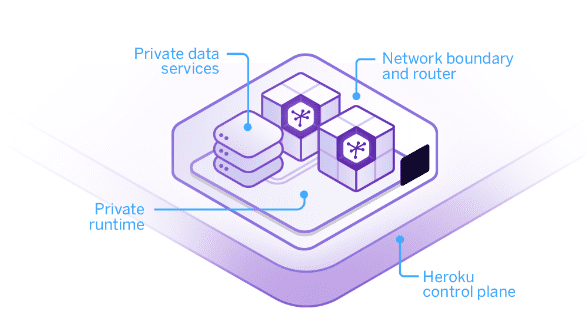
Heroku Enterprise's Private Space offers a secure, isolated environment for apps and data services, provisioned to a specific geographic region of your choice. This dedicated runtime environment ensures enterprise-grade security and enables seamless connectivity between Heroku applications, on-premise systems, and other cloud services like Salesforce. With Private Spaces, developers can leverage the robust Heroku developer experience to build modern apps while maintaining stringent network security protocols.
Does Heroku work in China?
There are two aspects to Heroku in China, the first - as a platform, and the second, as a platform used to build websites and web applications.
The Heroku application: Heroku users in China may experience slow or unreliable connections when attempting to access Heroku applications hosted outside of China. Similarly,
Heroku-built websites: Similar to Heroku applications, websites built using Heroku encounter performance and deliverability issues in China unless they have been optimized specifically for onshore delivery.
Chinafy for Heroku
Chinafy can be integrated with Heroku-built websites to accelerate the website’s performance for visitors in China. Additionally, Chinafy is able to uniquely scan, detect, and resolve third-party resource issues that surface when a Heroku website is accessed from China, without impacting how the Heroku website loads or functions for non-China visitors.
How Chinafy can help boost web performance in China?
Traditionally, resolving code-based incompatibility for China requires multiple in-house experts, not to mention a tedious, time, and costly process.
The optimization process includes but is not limited to -
Running website diagnostics and identifying slow and or blocked third party resources. A website consists of hundreds of resources. Commonly referenced examples of blocked resources are Youtube, Vimeo, Google APIs and more. However, the list of these resources are not widely available, inexhaustive, not to mention, often evolve.
Researching development best practices and service providers in the China web ecosystem.
Setting up monitoring on an ongoing basis,
Not to mention, making a change to optimise for the China website ecosystem may include compromises for the global audience and vice versa. For example, removing Vimeo from your website may negatively impact your global audience while benefiting your China audience.
Considerations may include changing your hosting stack. Should it be hosted in China, this would also require an ICP license, PSB filing and more.
Language barriers (most in China resources and consoles are only available in simplified Chinese)
All to say, the manual approach is a partial solution that may be an option for some, but not everyone.
For those looking for a more cost-efficient and lean solution, try Chinafy.
Chinafy is a website optimization platform that is able to take an existing website and re-engineer a version of it into a China-friendly equivalent.
The Chinafy platform is able to optimise a website whether it is hosted inside or outside of China, as it focuses on optimizing - by means of acceleration, replacing, removing, and more - third party resources based on best practices. Not to mention, it includes a fully-managed CDN - which Chinafy Enterprise users have the option to replace with their own CDN should they have a preference.
Chinafy enables Rule-Based Smart Action to resolve slow and inaccessible resources including YouTube/Vimeo embeds, Google Maps and more.
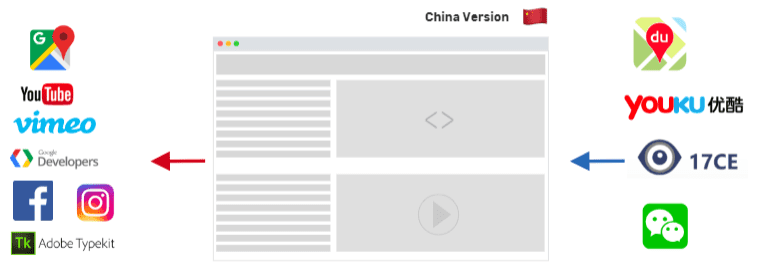
How Chinafy works:
Chinafy creates a 'China-specific' version of your site using publicly accessible HTML, CSS, and JS from your original site. Visitors coming from China IPs will be sent to the Chinafy-optimised version of the website. All others, back through the original “global” route.
The Smart Actions feature in Chinafy suggests rule-based modifications, addressing approximately 75% of the most blocked or slow resources. It replaces them with Chinese equivalents or removes blocked resources without a China-compatible replacement, ensuring minimal impact on the website's functionality. Then, Chinafy’s expert engineers create a custom subset of rules for each website - as no website is exactly the same.
Enterprise users have the option to create entirely customized technical stacks based on their needs.
Chinafy automatically incorporates China-friendly infrastructure for your site, including hosting, load balancers for managing traffic, and near-China premium CDN or in-China CDN should onshore hosting prerequisites be met.
The Chinafy version stays automatically updated to match your original site, ensuring timely reflection of any changes. Enterprise users benefit from ongoing change management, such as custom configuration with Imperva CDN or other providers.
By using Chinafy, websites on average become 30%-40% faster, as it effectively addresses resource compatibility issues impacting the loading process.
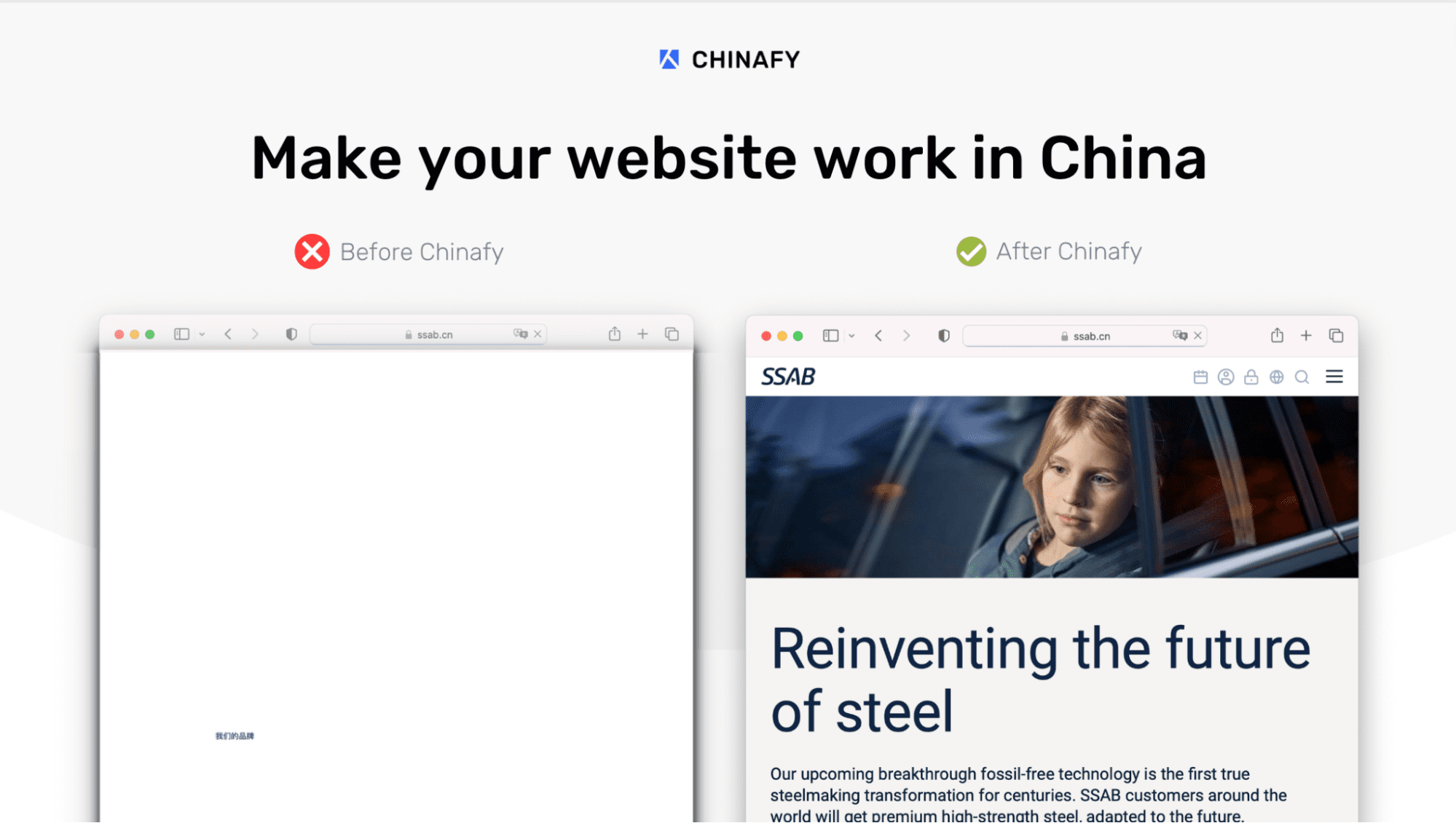
Ready to optimize your Heroku website for China? Click Get Started to evaluate your website with Chinafy.



1 - Expected post-Chinafy results






























